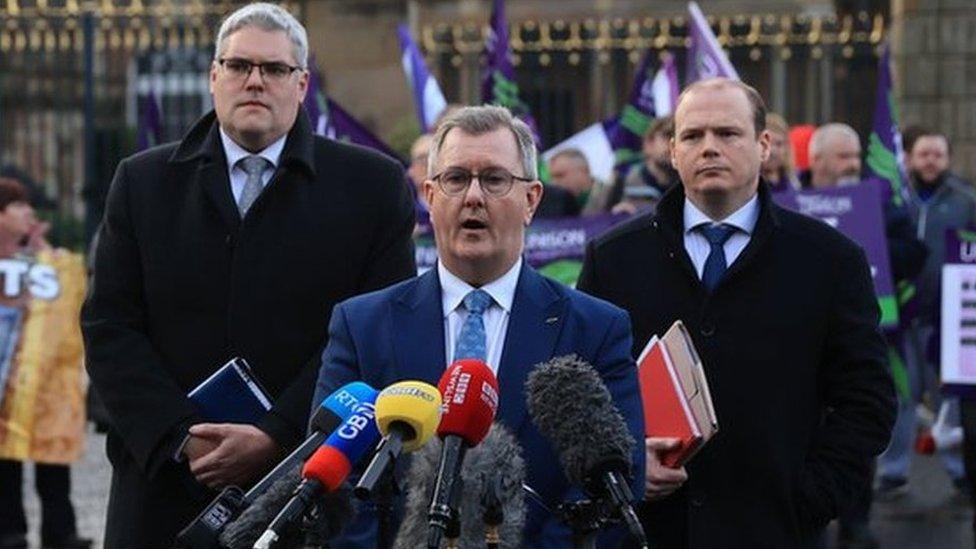Stormont talks: Is Sir Jeffrey tiptoeing his way to a deal?
- Published
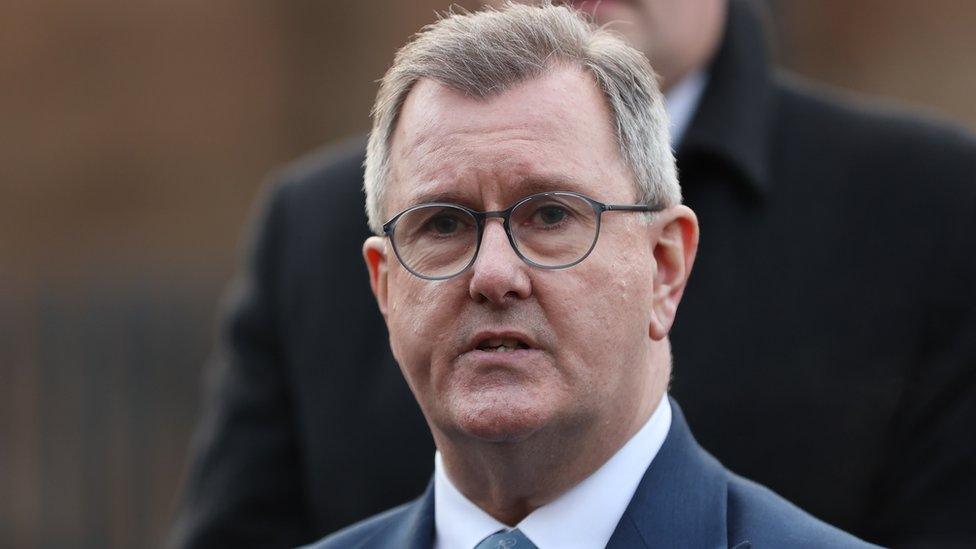
Sir Jeffrey Donaldson says he 'hasn't come this far to plan for failure'
Sir Jeffrey Donaldson is starting to sound like a leader tiptoeing his way back to Stormont.
The finish line is in sight for the DUP leader who is "approaching the time" for his party to make a decision.
A decision which he hopes will see his MLAs return to Stormont because he "hasn't come this far to plan for failure".
The DUP leader also warned "the final stages of any negotiation are the most challenging".
He is perhaps mindful of the internal battles he may face.
Northern Ireland's devolved government collapsed in February 2022 after the DUP withdrew in protest against post-Brexit trading arrangements between the region and Great Britain, known as the Irish Sea border.
Final hurdle
The final hurdle will come when DUP officers meet to pass their verdict on the proposed deal. That meeting is due to happen on Friday.
But the details of the final deal are slowly starting to emerge.
We now know the government is willing to amend the UK Internal Market Act to ensure Northern Ireland businesses will continue to have access to the UK market in "all scenarios".
This is understood to focus on how NI goods are treated as EU and GB standards diverge.
But that for many unionists is not a game changer as the legislation will only cover goods moving from NI into GB. Such legislation was always deliverable by the government.
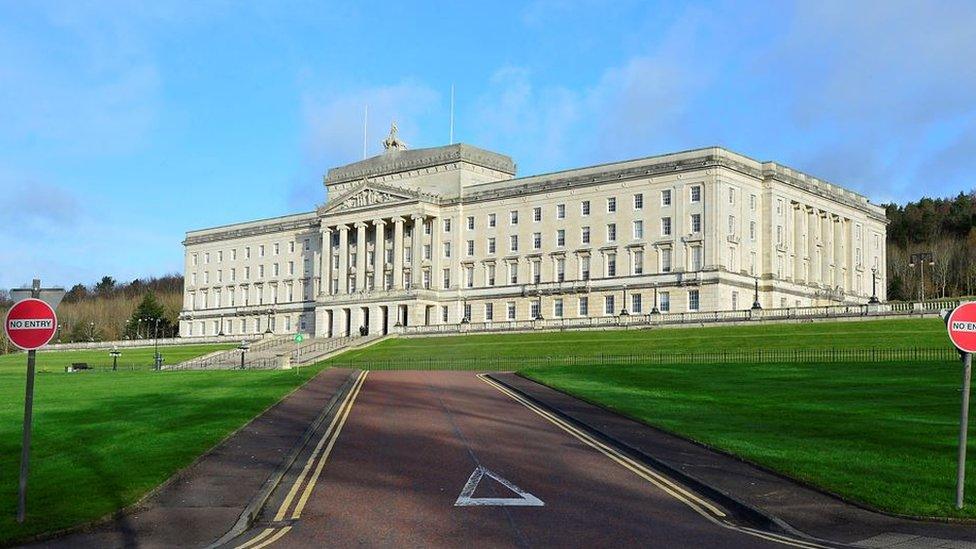
The DUP is holding talks with the government about returning to power-sharing government
A much bigger challenge comes in the control of goods moving from GB into NI which, under the Windsor Framework, will be subject to checks and paperwork.
Those checks are carried out on the red lane for goods travelling in to the EU and fewer controls in the green lane for goods remaining in Northern Ireland.
The lanes which are to be phased in have been in operation for three months, for food products without much controversy.
As a result there is every chance the EU may agree to easements and greatly reduce checks on the green lane. This could be done through the EU-UK joint committee which oversees the deal.
The DUP says it is willing to tolerate some checks to tackle "criminality and smuggling".
Constitutional concerns
In the face of constitutional concerns raised by the Irish Sea border the DUP has secured some measures to bolster Northern Ireland's place in the union. They include a new East West council which will bring together ministers from Stormont and the rest of the UK.
However it is not clear if the new body will have decision making powers.
There may be other moves to strengthen businesses links with the rest of the UK with extra funding. Legislation could also be amended to re-affirm Northern Ireland's place in the UK.
A key concern for unionists is the application of EU laws in Northern Ireland.
This is likely to remain a challenge as there is no sense the EU is open to fundamentally changing the Windsor Framework. Living under some EU legislation will be the price for open access to the EU single market, although the DUP will argue the Stormont Brake will allow the party to veto any new EU legislation in the future.
However the veto will rest ultimately in the hands of the government in London.
'Bullish'
Some elements of the proposed deal were discussed at a meeting of the party's MLAs on Monday where Sir Jeffrey outlined what he called significant progress. One source in the room described it as a "bullish performance".
But there was no sense the deal would be completed before Christmas.
That is not a view shared by the government. It is pressing the DUP to move "at pace" as suggested by the prime minister.
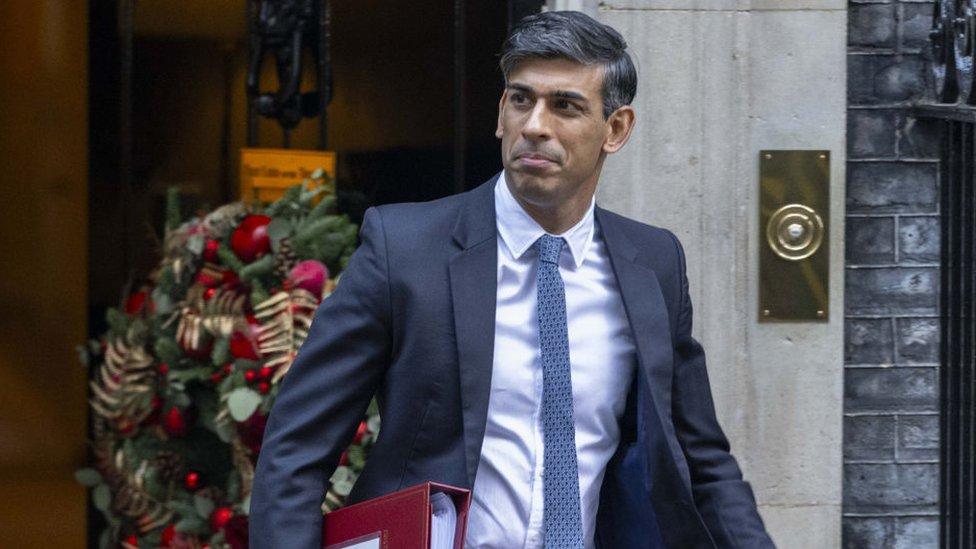
Rishi Sunak has said the government is ready to legislate to 'protect' Northern Ireland's place in the UK internal market.
The government's deadline is Tuesday when Westminster goes into recess for three weeks. It believes if the DUP party officers rubber stamp the deal in the coming days Stormont could be recalled next week and Executive ministers appointed.
That is likely to be followed by an improved financial offer from the treasury above the £2.5bn already promised.
But that timeline presents other challenges.
How might the public react if MLAs return to Stormont for a few days then disappear for Christmas after being deprived of a government for 22 months?
It may also expose the DUP to accusations of selling out if it returns to Stormont off the back of a multi billion pound financial package.
Sir Jeffrey Donaldson could also resist what some might view as a bid to bounce his party back to government before Christmas. As we are continually told he will not be "calendar led".
But if there is no agreement on a deal and no return to Stormont by next week then the Secretary of State Chris Heaton will be under pressure to respond.
His options could include declaring the negotiations with the DUP over and maybe publishing the proposed deal.
For him it will mean no more tiptoeing around the talks, his moment of truth will have arrived.
- Published12 December 2023
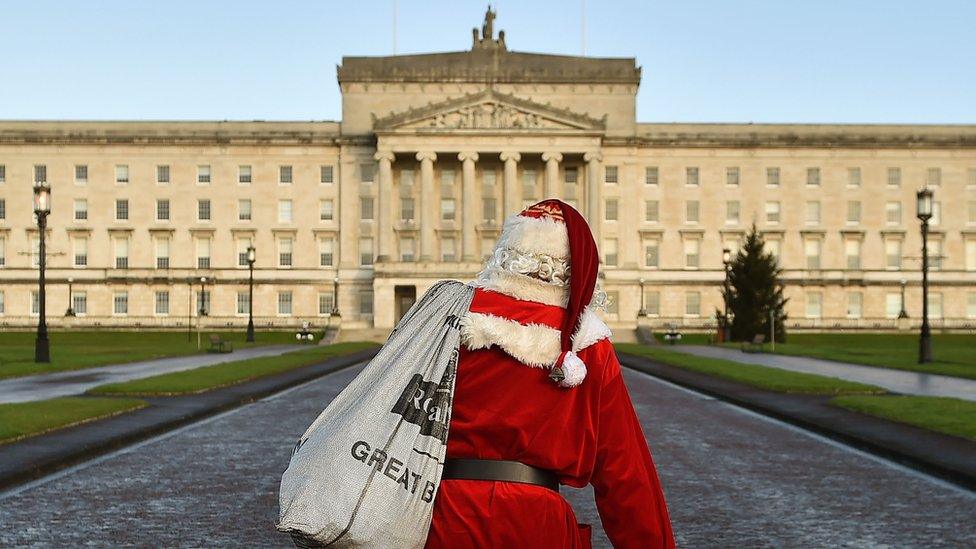
- Published11 December 2023

- Published14 December 2023
